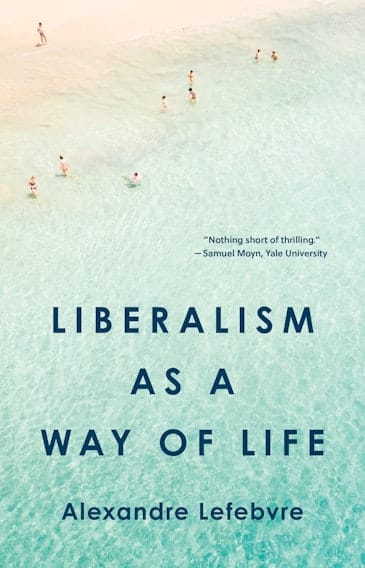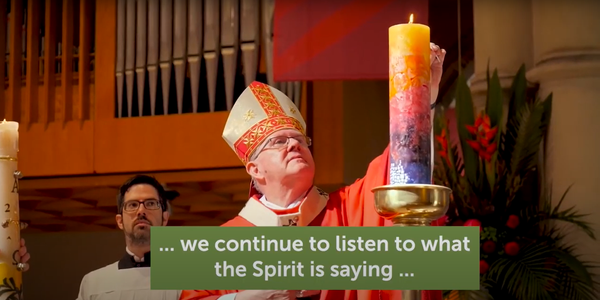A pinhole through which grace might come // Review: Bright Shining by Julia Baird
Julia Baird's bestseller 'Bright Shining' shows the grandeur and misery of liberal theology in a popular mode

Liberal Christianity is at a low ebb, but it was not always so. Until quite recently, it seemed obvious to all that notions like sin, judgment, and fear were relics of the past. Once they were snipped out of the purview of faith within the bounds of reason and good taste, organised religion went with them. No book exemplifies this trend better than the American philosopher John Dewey’s essay A Common Faith (1934), in which formerly religious terms like faith are translated from the supernatural to the natural. The end result being a faith of natural origin, said to belong in common to humankind and not to the “religions.” Dewey’s was a faith in humankind, in our essential goodness and capacity for growth. The priests of his natural faith were teachers—Dewey’s primary interest being education—and other civic-minded professionals, including journalists.
ABC journalist Julia Baird’s bestselling Bright Shining: How Grace Transforms Everything (2023) sits, unselfconsciously, in Dewey’s pragmatic lineage. Baird, one of a few public Christians at the ABC alongside Compass veteran Geraldine Doogue and Stan Grant, wrote Bright Shining as a follow-up to her best-seller Phosphorescence. In it she treads a trail Dewey already blazed, naturalising one of Christianity’s central themes and showing (but not necessarily convincing) the reader how, far from being the preserve of the churches, grace can be found anywhere a sensitive person cares to look.
So what does grace look like, when seen from the perspective of the ABC studios in Ultimo? “[F]irst of all, to be fully, thrillingly alive,” Baird writes. Perhaps there is a hint here of St Irenaeus of Lyons: “The glory of God is man fully alive,” but without his addendum that man’s glory is found in God. “Second, and most fundamentally, grace is something undeserved … it is mercy, not merit,” she continues. “Third, it is the ability to see good in the other, to recognise humanity, to tolerate difference and to continually plough lives, conversations and public debates with a belief that people can change, and that what we fight for is joy and beauty, as well as equality.”
Grace is not “pious or glib or easy” and is “arguably, the antithesis of cancel culture.” It involves a dimension of asceticism, she writes, insofar as to be gracious involves a war against selfishness. It possesses a sense of lightness, forgiveness, and kindness. There is a lot to agree with here, especially Baird’s insistence that grace is indispensable to public life. And can anyone argue that the ordinary Australian wants, and desperately needs, life to be more gracious? Like all liberalisms, the book is a testament to our natural capacity for goodness—and many of her anecdotes are legitimately uplifting. She is also a pacy and enjoyable writer. The book can be knocked over on a rainy afternoon with ease.
Invoking Simone Weil, the opposite of grace in Baird’s view is “gravity,” in particular “bodily gravity,” which the author experienced primarily as chronic illness—described in interludes throughout the book. One such interlude, “Restlaufzeit: In the time we have left, we must dance” discusses the clarity that comes with end-of-life experiences, with the restlaufzeit [remaining time] we have after the discovery of illness. While “sick idiots remain, quite often, idiots” and illness confers no special grace, the author says, she received her first surgery as a gift that made her live more urgently and intentionally. But after the fourth surgery, she writes, “I was definitely over it … I had had enough of depth, enough of suffering, and instead yearned for frivolity, nonsense and abandonment.” There are bestsellers about the wisdom of the dying, but few about the wisdom of the chronically ill. “What has pain taught me? I hate the question actually. I’d rather be taught by, say, an English professor, an Indigenous elder, a boat skipper or a professional free diver than by chronic pain."
This statement is really the interpretive key for the rest of the book, which is a collection of anecdotes and lessons from just these kinds of wise people about the meaning of grace. Baird is interested especially in the graciousness of people who have experienced suffering, and writes movingly about restorative justice. Bright Shining's best anecdote is a tangent that touches the circumference of the author’s private life. Baird’s mother was involved in prison ministry, and became friends with Katherine Knight, one of Australia’s worst murderers, who “killed her boyfriend, skinned him and boiled his body parts.” Baird writes that her mother was, beyond all explanation, once consoled by Knight in gaol after the killer’s conversion to Christianity. “Who wouldn’t be cynical about such a conversion?” Baird asks, before describing how Knight became a moral authority in Mulawa gaol, loved by the inmates to the point that she could mediate violent conflicts by sheer presence.
“Imagine if we flipped our standard of judgment from magnifying shortcomings to … scrabbling through dirt when you see a tiny glimmer of light,” Baird writes in her conclusion to the Knight anecdote. Yet she is also uninterested in “cheap grace” and in places extols the virtue of withholding forgiveness for the sake of a greater justice. These are perhaps the greatest signs that we are in the purview of a “natural” account of grace—or at least a collapsed version of “common grace”—circumscribed by personal judgments. We have left the supernatural behind altogether, or have suppressed it to a mere phosphorescence of nature. Her other chapters, especially those dealing with sin, subsequently fall into journalistic nostrums about the sinfulness of culture: power dynamics, gender, indigeneity.
There is much to admire about Baird’s dogged attempt to draw attention to the angels of our better nature. Conservatives tend to write off liberal Christianity as intentionally corrupt from the outset, but the opposite is true. The intention was to preserve Christianity from the purported epistemic collapse of the knowledge of God. The object was what was lacking; liberals projected into the heart of God an unsustainable faith in human goodness. The survival of liberal theology after the wars of the 20th century is, like many 21st century survivals, half-caused by our denial of just what happened in the last hundred years of human history. It also survives on a whiff of the evident goodness of human life, while shying away from the conditions for goodness. So like all liberal theology, Bright Shining shows more than anything the indispensability of sin, a doctrine that has no grounding in nature, as the necessary supplement to discussions about grace.
Grace is not, as Baird wishes to illustrate, simply a “bright shining” that can be found even in fallen souls. Nor does it bubble up from some hidden pure place in the soul, like clear water from a fouled spring. Grace heals, but also falls on the person like hammer blows from the other world. It is thorns in the flesh, chastisements, humiliation, hidden shame, and, yes, illness. Grace both punishes and redeems, and gives strength to enjoy as well as endure. If grace is merely natural, there is no place for this dialectic; nature does not wish to suffer, and tires of giving, of receiving pleasure, and even of making meaning.
In a recent letter on the 17th century French polymath Blaise Pascal, Pope Francis made this seeming paradox clear: humankind’s grandeur is inseparable from the anxious awareness of our misery without God. Quoting Pascal, the pope wrote:
“‘What a fantastic creature is man, a novelty, a monstrosity, chaotic, contradictory, prodigious, judge of all things, feeble earthworm, bearer of truth, mire of uncertainty and error, glory and refuse of the universe! Who can undo this tangle?’ As a philosopher, Pascal saw clearly that ‘the greater our intelligence, the more we discover man’s grandeur and his baseness,’ and that these contradictions are irreconcilable.”
As a work of public theology—which Bright Shining is, despite its natural focus and popular audience—the book lets its readers down by reducing grace to a moral impulse within the power of the human will. In Baird’s view, we can choose to be gracious, and ought to. And on the natural level, perhaps we can, if we accept her definitions. If the project Dewey and other liberals embarked upon was to show that the naturalisation of Christianity could be completed without any meaningful loss, they have simply been proven wrong. If there was no lack, how else can we explain the tension in Bright Shining between the glowing anecdotes about the grace of others, and Baird’s frustrated treatment of her own suffering?
Grace is a gift we can give to others, but one can hardly be gracious to oneself. The Golden Rule commands us to love neighbour as ourselves, but not to love the self; to attempt to do so is to exclude the negative dimension of life from grace. If we are honest with ourselves, this negative dimension comprises a not insignificant part of our subjectivity, especially concerning life in the body. Say a person suffers from a chronic illness, like type one diabetes. Are they less gracious by having no special wisdom to teach others as a fruit of their illness? Is to admit as much a lack of graciousness towards the self? Or is it the case that illness can be a gift by which God teaches the individual the nature of duty? The natural man, desiring self-esteem and comfort, would prefer to treat such a thing as an unfair impediment, attracting sympathy, or as a cruel diversion from the goodness of life. But as Pascal (who died, aged 39) wrote in his Prayer to ask God of the proper use of sickness:
“Remove from me then, Lord, the sadness that the love of self might give me for my own sufferings and for the things of the world that do not succeed to the satisfaction of the inclinations of my heart, and that do not regard thy glory; but create in me a sadness in conformity with thine.”
If grace is an efflorescence of nature, a “bright shining” of the person not to be hidden under a tub, then whole territories of experience become null. Why pray for sadness? Why ask God for the grace to be alienated from this body of death and the good world in which it is nevertheless entombed? Grace becomes comfort, and not action; a salve, and not a sign. Paradoxically, the sick person is sometimes made well by sickness. As so many of the church fathers write, such humiliations conducive to spiritual health are free of charge.
To return to Baird’s ancestor, John Dewey: the tragedy of such texts is to hold out a vision of common life predicated on the impossible. And there are no ministers of an impossible God. To hold up seeming moral exemplars as models of grace for imitation is to misunderstand, fundamentally, what a gift grace is. Our natural moral claims are, after all, often riven with decay of their own, like all natural things. The will fails. To demand those created sick to be sound is the reason grace cannot be secularised and turned into a virtue. It is why Dewey’s secular clergy have fallen massively out of favour, except in the institutions in which they remain influential.
Yet Baird and her colleagues are not alone in naturalising grace; many Christians in all denominations, clergy included, preach a Gospel in which grace is nothing more than a technique to edify the human imagination. The end result is, as Baird’s book shows, the desire to pick winners—which she does, in her treatments of the Voice to Parliament referendum and COVID-19 pandemic response. In this she is hardly far from much of naturalised Christian life.
The paradox of grace is that the more we realise our own dependence on God, the greater the value of the gifts we receive, in whatever form they take. Grace is indeed “bright shining,” but, as Pascal repeats throughout his Pensees, God gives light to those who seek him with faith, and obscures those who do not. We do not only “feel the sun on our faces, and know we are alive,” as Baird concludes her book. We also see the eclipse of life in a new light. A dark and luminous night of the soul. And through this negative dimension of life a pinhole is poked, through which bright promises may yet shine—but not from ourselves.





